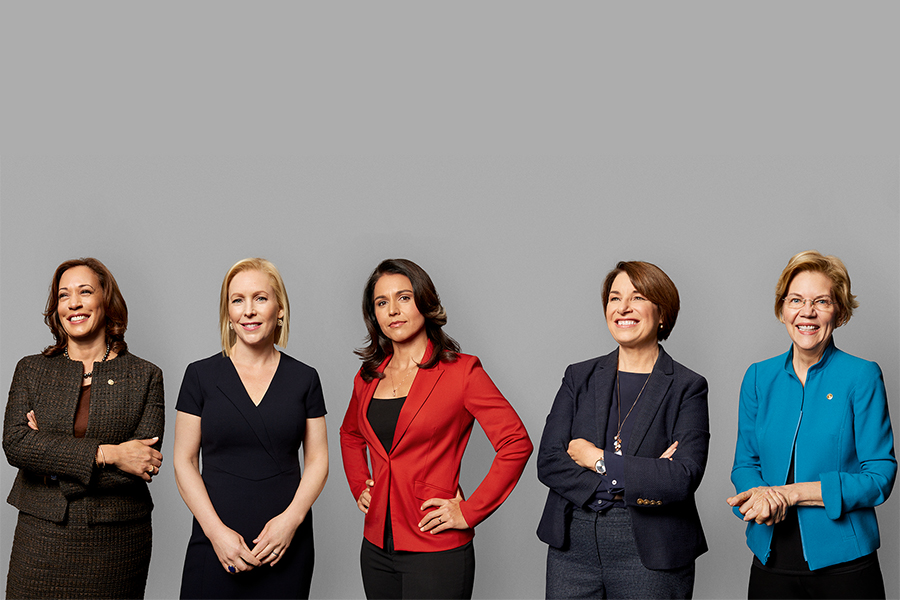An Emerson poll out of Iowa March 24 has three white men leading the 2020 Democratic presidential primary: Former Vice President Joe Biden, Sen. Bernie Sanders (I-VT) and South Bend Indiana Mayor Pete Buttigieg, who leads Sen. Kamala Harris (D-CA) by one point. There are currently 15 Democrats running — nine men and six women.
While 2016 was historic for the first woman nominee, 2020 is also historic: There has never been a presidential race with so many women candidates. Four of those women — Harris, Sen. Kirsten Gillibrand (D-NY), Sen. Amy Klobuchar (D-MN) and Sen. Elizabeth Warren (D-MA) — are among the smartest, most accomplished and most progressive to ever run.
And, yet mainstream media coverage of the candidates has been saturated with gendered-biased reporting despite the overwhelming wins by women in the 2018 midterm elections.
Mainstream media is rife with stories about Biden, who has yet to announce, and Sanders, who is running the same platform that failed to capture the 2016 nomination and lost Sanders the primary in a landslide of four million votes. Biden, 76, and Sanders, 77, are the two oldest candidates to run for president and the 2020 nominee must be prepared to be the 2024 incumbent. Both men would be in their mid-80s, which argues strongly against a second term.
On the more youthful end, media hype has also surrounded former Texas congressman and failed Senate candidate Beto O’Rourke, who has been making news primarily for jumping on chairs and restaurant counters as he campaigns, while the women senators roll out policy after policy.
Buttigieg, the first out gay candidate running as a Democrat, at 37 is the youngest in the race. He has received increased media attention after his fundraising efforts got him into the debates. But as with O’Rourke, consistent gaffes suggest he’s not quite ready for the presidency.
Stories on O’Rourke and Buttigieg detail what they could accomplish rather than what they have accomplished. O’Rourke has a solidly centrist record from his six years in the State House. But his unremarkable tenure there stipulates to what feminists have long argued: Men are promoted according to their prospective promise while women must have long and impressive resumes to even be considered in the same role.
The women senators have impressive resumes. One of them should be our next president.
Harris, Warren, Gillibrand and Klobuchar have extensive histories of getting things done, both while in Congress and in their prior jobs. Both Harris and Klobuchar were prosecutors and Harris was the attorney general of California. Gillibrand has a national reputation for her work for sexual-assault victims. Warren has been the voice in Congress for consumers. She founded the Consumer Financial Protection Bureau during the Obama Administration.
Warren and Gillibrand rank as the top two most progressive senators, with Harris in the top 10. Klobuchar ranks as more centrist, but is also known for crossing the aisle to get bipartisan legislation passed. No senator has passed more legislation than Klobuchar, according to the GovTrack.us. In 2016 alone she passed more legislation than Sanders has in his entire career as a senator.
Yet the polls show that media hype has all gone to the men — even Andrew Yang, the venture capitalist candidate who ranks in the lower percentile of the race has gotten more media response than the four women senators who are literally pushing policy and reforms every day. Name recognition is one clear reason for Biden and Sanders leading in the polls. But without media attention, the women can’t become better known. It’s a vicious media cycle.
Women who run for office face unquestionable misogyny that puts them at an immediate disadvantage. But Hillary Clinton still won the 2016 nomination and also received more votes than any presidential candidate in U.S. history except Barack Obama in 2008. Clinton won the popular vote, receiving three million more votes than Donald Trump. A confluence of things kept her from the White House, but she still got the votes.
In 2018, women ran in historic numbers and there are now more women in the 116th Congress than ever in history. Women have also led the resistance against Trump from the outset. The 2017 Women’s March was the largest protest in American history with more than three million marchers nationwide.
So there’s no substantive reason why a woman can’t win 2020 — the gendered media presents the biggest impediment. This week alone Harris, Gillibrand and Warren have all rolled out significant policy proposals and been met with few headlines, while on March 26 alone there were seven major stories about Biden.
The 2016 race aside — which was complicated by a number of factors — when women run, they win. There is no reason to think a woman can’t win the 2020 nomination or the presidency. In fact, the midterms argue for a woman winning 2020 and against a candidate like Biden rising. Arguably one of the best-known winners of a 2018 race is Rep. Alexandria Ocasio-Cortez (D-NY) who trounced a 10-term Democratic incumbent who was remarkably similar to Biden. There were several such races and in each, an older white man was bested by a younger woman.
Why not 2020? Media argues that O’Rourke is a charismatic crowd-pleaser. But Harris has an overflow of charisma and her opening rally was huge, with 30,000 attending, besting all the male candidates.
Each of these women offers what the well-hyped men do, and then some. The only thing standing in the way of a woman president may be media coverage, which needs to pay attention to the women as well as the men.

